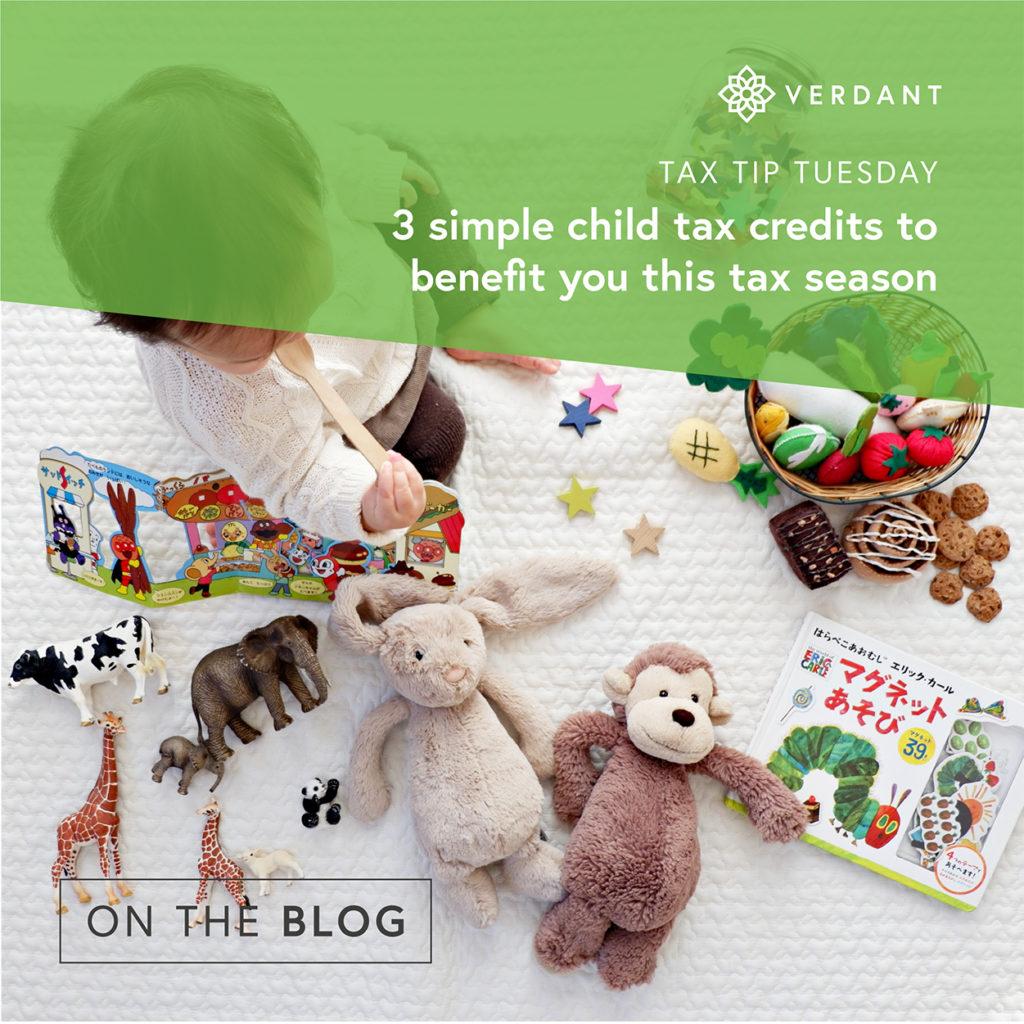As much joy and wonder children bring into this world, starting and raising a family can get pretty expensive. But did you know there are tax credits and deductions designed around children and families?
Let’s discuss three tax credits that can help ease your tax burden.
The Child Tax Credit
Here is the first break you’ll have since having children! To claim the child tax credit, you need to be the parent or guardian of a minor child (under the age of 17).
Here are seven qualifying tests to determine if your child meets the eligibility requirements to claim the child tax credit:
Dependent Test – you must claim the child as a dependent on your tax return. To claim a child as a dependent he or she must:
1. Be your child
2. Be under age 19, or under age 24 and a fulltime student for at least five months of the year; or be permanently disabled, regardless of age
3. Have lived with you for more than half the year
4. Have provided no more than half of his or her own support.
Age Test – the child must be under age 17 at the end of the year.
Relationship Test – the child must be your own child, a stepchild, or a foster child.
Support Test – the child cannot have provided more than half of his or her own financial support.
Citizenship Test – the child must be a U.S. citizen.
Residence Test – the child must have lived with you for more than half of the tax year.
Family Income Test – In 2018, the phaseout of the credit begins with $200,000 ($400,000 for married filing jointly).
The Taxpayer Relief Act of 1997 created the child tax credit to help ease the financial burden on American families’ raising children. There have been many versions of the credit since its inception.
Before the TCJA, the credit phased out if your household income was above $150,000. With the new law, it doesn’t phase out until the household income is above $200,000 for single taxpayers or $400,000 for married taxpayers filing jointly. It also allows up to $1,400 of the child tax credit to be refunded if your tax bill is zero. That is $1,400 per child!
The Child and Dependent Care Credit
Did you know
Nebraska is the least affordable state for families with an infant or a toddler in family childcare. Single parents spend about 46% of their income on childcare and for married couples with two or more children, that percentage skyrockets to just over 93%. It’s important to know that if you rely on childcare support, you may be eligible for a tax deduction. (source)
You can claim your childcare expenses for any child under 12 in your household who is also claimed as a dependent on your tax return. For a single child, you can deduct a percentage of up to $3,000 in childcare expenses. For two or more children, you can deduct a percentage of up to $6,000. Families can qualify for the credit at any tier of income, but it will dictate how much credit you qualify for.
Figuring out your percentage
That percentage will depend on your income. If it’s below $15,000, you’ll get back 35% of your childcare costs (capping at the mentioned limits above). From there, that percentage drops by 1% for every additional $2,000 of earnings, and once your income reaches $43,000 or more, you’re limited to 20% of up to $3,000 or $6,000 in childcare costs. If these numbers look higher than in previous years it’s because they are. These numbers increased in 2018 with the tax reform.
One thing to note
Unlike a deduction, a tax credit is a reduction on your tax bill. It directly reduces the amount you owe to the IRS, meaning you will not receive a physical check for it.
The Earned Income Tax Credit (EITC)
Alas! One more opportunity where having children can help lessen your tax burden. This tax credit is not specifically kid related but having children increases your chances of eligibility, and also raises the value of what the credit is worth.
The Earned Income Tax Credit or EITC is designed for low-income households. To qualify, your tax-filing status must be either single, married filing jointly, head of household, or qualifying widow, and you can’t have investment income over $3,600.
The table illustrates the qualifying criteria:
| Tax Filing Status | No Children | 1 Child* | 2 Children* | 3 or More Children* |
|---|---|---|---|---|
| Single, head of household, or widowed | $15,570 | $41,094 | $46,703 | $50,162 |
| Married filing jointly | $21,370 | $46,884 | $52,493 | $55,952 |
Source: IRS
Click here to view more criteria published by the IRS
The EITC could benefit you substantially
Up to $6,557 if you have three or more children.
Up to $5,828 if you have two or more children.
Up to $3,526 if you have one child or more.
Up to $529 with no qualifying children.
One thing to note
The EITC is one of the few tax credits that’s fully refundable. You will receive a physical check for the amount you are eligible for.
We always recommend consulting a tax professional about your tax situation. Schedule an appointment with your CPA to make sure you’re on the right track for a successful tax season. Only a few more weeks left! Contact us today for a free consultation.

